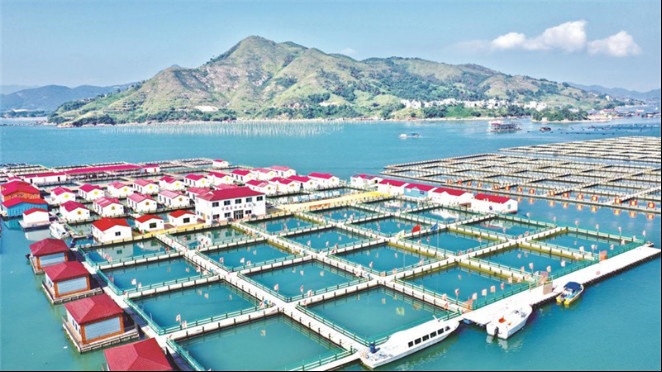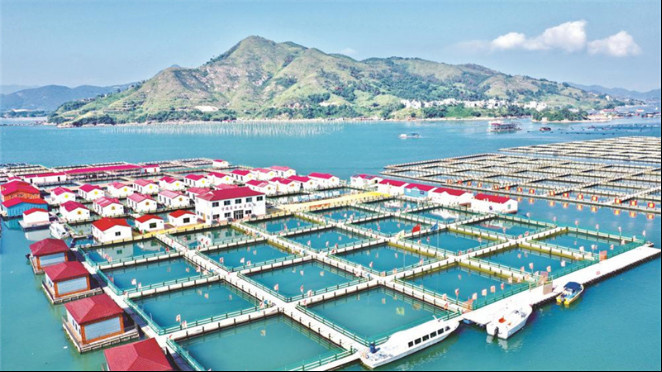By Lian Jintian, People's Daily

Photo shows a fish farm in Xi'nan township, Puxia county, Ningde city, southeast China's Fujian Province. (Photo/Fujian Daily)
The large yellow croaker is an endemic commercial fish in coastal areas of China. The sea area in Ningde city, southeast China's Fujian Province is an important inner bay spawning ground for large yellow croakers.
However, overfishing led to a sharp decline in the population of wild large yellow croaker in the 1960s and 1970s, and the species was once in danger of extinction.
Nowadays, the large yellow croaker has embraced a revival.
According to statistics from the Ningde's government, last year, the total production of large yellow croakers in the city reached 191,000 tonnes, accounting for 80 percent of the country's total production. The output value of the fish reached about 6.92 billion yuan (about $976 million) in the same year.
Over the past few decades, government departments, research institutions and fishermen in Ningde have taken concerted efforts to promote the scientific cultivation of large yellow croakers and improve the aquatic environment.
As a result, the fish population has gradually recovered. Nowadays, the breeding of large yellow croakers is carried out on a large scale and in a scientific manner, achieving high-quality development in the relevant industries.
In July 2018, Ningde carried out comprehensive management of seawater, as well as the transformation and upgrading of the fish breeding. Under the coordinated efforts of multiple departments, Ningde built a new order for marine farming which features clarified seawater ownership rights and a grid-based management model.
To date, the city has shut down or upgraded nearly 1.43 million outdated breeding cages and removed 106,000 tonnes of floating garbage and 5.38 million foam balls from the ocean.
The city has also taken intensive efforts to upgrade and renovate farming facilities.
"We encourage farmers to renovate small breeding cages into bigger ones and turn big breeding cages into deeper ones, with subsidies provided by the government," introduced Huang Shaoyuan, a researcher from the ocean and fisheries bureau of Ningde.
So far, the city has built 3,450 deep and large breeding cages, which are arranged more properly and scientifically, with enough distance left between the breeding cages to guarantee a smooth flow of water, Huang said.
Huang noted that governments at various levels in Fujian have invested more than 4.5 billion yuan to build a total of 440,000 ecological breeding cages for marine farming. The cages, each with a depth of 12 meters and 26-meter side lengths, are placed deep in the seawater, improving the production and quality of aquatic products.
Ningde has promoted smart breeding by operating fish farms through the application of technology.
The deepwater plastic fish farm of Fujian Sanduao Foodstuff Co., Ltd., which can withstand winds and waves, is located in Sandu Bay, Ningde. The fish farm has 84 large breeding cages, with each covering one mu (0.067 hectares), as well as 9 buildings with red roofs which are connected by walkways.
"We used to cultivate fish in small cages and walk on channels built from floating balls, bamboo poles and wood boards. I often fell into the water. Nowadays, as the new walkway is more than two meters wide, I can run on it," said Song Xiangguo, head of the breeding base who has 26 years of experience in the industry.
"In the past, I carried fish feed on my shoulders, and nowadays, I provide food for the fish through a pipeline. I can conveniently take care of the fish via my mobile phone which is connected with smart monitoring poles installed in the fish farm through the 5G network," Song added.
Four wind turbines are installed on the roof of the fish farm's power generation house. The wind turbines, together with the solar photovoltaic devices, are connected to the power storage facility and the electric transducer of the fish farm.
The fish farm has a set of seawater desalination equipment to supply household water. Both solar photovoltaic panels and wind turbines can produce electricity for the farm, and the electricity can be stored to support the farm all day long, Song said.
At a fish hospital located in the sea area, a farmer was seeking medical treatment for his fish. The fish was carefully examined by a technician under a microscope, and an expert conducted remote consultation for the fish based on real-time medic images.
Today, Ningde has established a fish disease prevention and control network covering a green fish breeding technology service platform at the municipal level. Fish hospitals and medical service centers have also been built at the county, township and village levels.
Ningde has been continuously exploring the industrial value of large yellow croakers. With its scale exceeding 10 billion yuan, the large yellow croaker industry of Ningde boasts an industrial chain involving fry hatching, breeding, processing, cold-chain logistics and transportation, and marketing.
Large yellow croakers have been sold on the Internet. Local fish farmers have cultivated many brands of large yellow croaker products through livestreaming and other new media measures.
In addition, the popularity of precooked food has driven the development of local aquatic product companies in Ningde. The processed products from Ningde have been sold to Japan and South Korea and the annual sales of frozen fish products can reach 30 to 40 million yuan.
Today, in addition to cultivating and selling fish, fish farmers in Sandu Bay are also benefited from the beautiful scenery of the sea. In many fishing villages, local fish farmers have built homestays in their fish farms, embarking on a path toward prosperity through the integration of fish farming and tourism.
However, overfishing led to a sharp decline in the population of wild large yellow croaker in the 1960s and 1970s, and the species was once in danger of extinction.
Nowadays, the large yellow croaker has embraced a revival.
According to statistics from the Ningde's government, last year, the total production of large yellow croakers in the city reached 191,000 tonnes, accounting for 80 percent of the country's total production. The output value of the fish reached about 6.92 billion yuan (about $976 million) in the same year.
Over the past few decades, government departments, research institutions and fishermen in Ningde have taken concerted efforts to promote the scientific cultivation of large yellow croakers and improve the aquatic environment.
As a result, the fish population has gradually recovered. Nowadays, the breeding of large yellow croakers is carried out on a large scale and in a scientific manner, achieving high-quality development in the relevant industries.
In July 2018, Ningde carried out comprehensive management of seawater, as well as the transformation and upgrading of the fish breeding. Under the coordinated efforts of multiple departments, Ningde built a new order for marine farming which features clarified seawater ownership rights and a grid-based management model.
To date, the city has shut down or upgraded nearly 1.43 million outdated breeding cages and removed 106,000 tonnes of floating garbage and 5.38 million foam balls from the ocean.
The city has also taken intensive efforts to upgrade and renovate farming facilities.
"We encourage farmers to renovate small breeding cages into bigger ones and turn big breeding cages into deeper ones, with subsidies provided by the government," introduced Huang Shaoyuan, a researcher from the ocean and fisheries bureau of Ningde.
So far, the city has built 3,450 deep and large breeding cages, which are arranged more properly and scientifically, with enough distance left between the breeding cages to guarantee a smooth flow of water, Huang said.
Huang noted that governments at various levels in Fujian have invested more than 4.5 billion yuan to build a total of 440,000 ecological breeding cages for marine farming. The cages, each with a depth of 12 meters and 26-meter side lengths, are placed deep in the seawater, improving the production and quality of aquatic products.
Ningde has promoted smart breeding by operating fish farms through the application of technology.
The deepwater plastic fish farm of Fujian Sanduao Foodstuff Co., Ltd., which can withstand winds and waves, is located in Sandu Bay, Ningde. The fish farm has 84 large breeding cages, with each covering one mu (0.067 hectares), as well as 9 buildings with red roofs which are connected by walkways.
"We used to cultivate fish in small cages and walk on channels built from floating balls, bamboo poles and wood boards. I often fell into the water. Nowadays, as the new walkway is more than two meters wide, I can run on it," said Song Xiangguo, head of the breeding base who has 26 years of experience in the industry.
"In the past, I carried fish feed on my shoulders, and nowadays, I provide food for the fish through a pipeline. I can conveniently take care of the fish via my mobile phone which is connected with smart monitoring poles installed in the fish farm through the 5G network," Song added.
Four wind turbines are installed on the roof of the fish farm's power generation house. The wind turbines, together with the solar photovoltaic devices, are connected to the power storage facility and the electric transducer of the fish farm.
The fish farm has a set of seawater desalination equipment to supply household water. Both solar photovoltaic panels and wind turbines can produce electricity for the farm, and the electricity can be stored to support the farm all day long, Song said.
At a fish hospital located in the sea area, a farmer was seeking medical treatment for his fish. The fish was carefully examined by a technician under a microscope, and an expert conducted remote consultation for the fish based on real-time medic images.
Today, Ningde has established a fish disease prevention and control network covering a green fish breeding technology service platform at the municipal level. Fish hospitals and medical service centers have also been built at the county, township and village levels.
Ningde has been continuously exploring the industrial value of large yellow croakers. With its scale exceeding 10 billion yuan, the large yellow croaker industry of Ningde boasts an industrial chain involving fry hatching, breeding, processing, cold-chain logistics and transportation, and marketing.
Large yellow croakers have been sold on the Internet. Local fish farmers have cultivated many brands of large yellow croaker products through livestreaming and other new media measures.
In addition, the popularity of precooked food has driven the development of local aquatic product companies in Ningde. The processed products from Ningde have been sold to Japan and South Korea and the annual sales of frozen fish products can reach 30 to 40 million yuan.
Today, in addition to cultivating and selling fish, fish farmers in Sandu Bay are also benefited from the beautiful scenery of the sea. In many fishing villages, local fish farmers have built homestays in their fish farms, embarking on a path toward prosperity through the integration of fish farming and tourism.
 Menu
Menu
 The revival of large yellow croaker industry in Ningde, China
The revival of large yellow croaker industry in Ningde, China
















